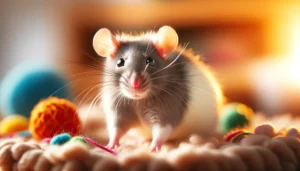Understanding the Rex Rat’s Dietary Needs
Rex rats, known for their curly fur and playful personalities, require a well-rounded diet to thrive. As a responsible pet owner, understanding their specific nutritional needs is crucial to ensure their health and longevity.
Nutritional Requirements of Rex Rats
Rex rats, like all rats, are omnivores. This means their diet should include a balance of proteins, carbohydrates, fats, vitamins, and minerals. Protein is particularly important for their growth, while carbohydrates provide energy. Healthy fats support their skin and coat.
Recommended Foods for Rex Rats
A high-quality rat pellet should form the basis of a Rex rat’s diet. Look for pellets that are specifically formulated for rats, as these will contain the right balance of nutrients. Additionally, fresh fruits and vegetables can be offered as supplements. Some good options include apples, carrots, and broccoli. It’s important to wash all fruits and vegetables thoroughly before feeding them to your rat.
Avoid These Foods
Certain foods should be avoided as they can be harmful to Rex rats. These include sugary treats, as rats are prone to obesity and diabetes. Processed foods, like chips and cookies, should also be avoided. Additionally, foods that are toxic to rats, such as chocolate and avocado, should never be fed to them.
Feeding Schedule
Rex rats should have access to food at all times. This means their food bowl should always be filled with pellets. Fresh fruits and vegetables can be offered once a day as a supplement. It’s important not to overfeed your rat, as obesity can lead to health problems.
Hydration
Fresh, clean water should always be available to your Rex rat. Water bottles are preferable to bowls, as they are less likely to spill or become contaminated.
Conclusion
Understanding the dietary needs of Rex rats is essential for their health and well-being. By providing them with a balanced diet that meets their nutritional requirements, you can ensure that your Rex rat lives a long, healthy life.
Feeding Recommendations for a Healthy Rex Rat

Rex rats, with their luxurious curly coats and charming personalities, are beloved pets for many. Ensuring they receive a proper diet is crucial for their health and well-being. Here’s a guide to feeding your Rex rat for optimal health:
1. Understanding Rex Rat Nutrition
Rex rats, like all rodents, are omnivores. Their diet should be balanced and varied to meet their nutritional needs. A good quality rat pellet should be the staple of their diet, providing essential nutrients and vitamins.
2. Fresh Water is Essential
Always ensure your Rex rat has access to fresh, clean water. Water bottles are preferable to bowls as they keep the water clean and prevent spills.
3. Vegetables and Fruits
Offer a variety of fresh vegetables and fruits daily. Leafy greens like kale, spinach, and lettuce are excellent choices. Fruits such as apples, bananas, and berries can be given in moderation as treats.
4. Protein Sources
Protein is essential for a Rex rat’s diet. Offer lean sources of protein like cooked chicken, eggs, or tofu. Avoid fatty or processed meats.
5. Avoid Sugary and Processed Foods
Sugary and processed foods can lead to obesity and dental issues. Avoid feeding your Rex rat sugary treats, chocolate, or processed foods.
6. Monitor Portion Sizes
Rex rats are prone to obesity, so it’s important to monitor their portion sizes. A good rule of thumb is to feed them a tablespoon of pellets per day, along with a small amount of vegetables and fruits.
7. Food Rotation
Rotate the types of food you offer to ensure your Rex rat receives a variety of nutrients. This also helps prevent them from becoming picky eaters.
8. Consult a Vet
If you’re unsure about your Rex rat’s diet or if they have specific dietary needs due to health issues, consult a veterinarian specializing in small animals.
Common Mistakes in Rex Rat Diet
Rex rats, with their curly fur and playful demeanor, are delightful pets. However, ensuring they receive a well-balanced diet is crucial for their health and happiness. Despite their small size, these rodents have specific nutritional needs that, when overlooked, can lead to various health issues. Let’s explore some common mistakes owners make in their Rex rats’ diets and how to avoid them.
1. Inadequate Variety in Food Choices
Problem: Offering the same food every day can lead to nutrient deficiencies and boredom for your Rex rat.
Solution: Provide a diverse range of foods, including fruits, vegetables, grains, and proteins, to ensure they receive all necessary nutrients. Rotate their diet regularly to keep them interested and ensure a balanced intake.
2. Overfeeding or Underfeeding
Problem: Incorrect portion sizes can lead to obesity or malnutrition in Rex rats.
Solution: Follow recommended portion sizes based on your rat’s age, size, and activity level. Monitor their weight and adjust accordingly to maintain a healthy balance.
3. Ignoring Fresh Water Needs
Problem: Rex rats need access to fresh, clean water at all times.
Solution: Ensure they have a water bottle or dish that is changed daily to prevent contamination. Lack of water can lead to dehydration and health issues.
4. Excessive Treats
Problem: Overindulging in treats can lead to obesity and nutrient imbalances.
Solution: Treats should make up only a small portion of your rat’s diet. Choose healthy options like fruits, vegetables, or small amounts of lean protein.
5. Lack of Calcium and Vitamin D
Problem: Rex rats are prone to calcium deficiency, which can lead to bone disorders.
Solution: Provide calcium-rich foods like kale, broccoli, or fortified foods. Ensure they also receive adequate vitamin D through exposure to natural sunlight or a UV lamp.
6. Inconsistent Feeding Schedule
Problem: Irregular feeding times can disrupt your rat’s digestive system and lead to health issues.
Solution: Establish a regular feeding schedule and stick to it. This helps maintain their digestive health and prevents overeating.
7. Not Monitoring Food Quality
Problem: Low-quality or contaminated food can harm your Rex rat’s health.
Solution: Purchase food from reputable sources and check for signs of spoilage or contamination before feeding.
8. Lack of Knowledge About Toxic Foods
Problem: Some foods, like chocolate, caffeine, or certain fruits and vegetables, can be toxic to rats.
Solution: Educate yourself about foods that are harmful to rats and avoid feeding them these items.
In conclusion, understanding and meeting the dietary needs of your Rex rat is essential for their health and well-being. By avoiding these common mistakes and providing a balanced diet, you can ensure a happy and healthy life for your furry friend.
Supplements and Treats for Rex Rats
Rex rats, with their soft, curly fur and playful personalities, are delightful pets. To keep them healthy and happy, it’s crucial to provide a balanced diet that includes essential nutrients. Supplements and treats can play a role in enhancing their diet, but it’s important to choose wisely to avoid health issues. Here’s a guide to the supplements and treats that are safe and beneficial for your Rex rat.
1. Understanding Rex Rat Nutritional Needs
Rex rats require a diet rich in protein, fiber, vitamins, and minerals. A well-balanced diet consists of high-quality rat pellets, fresh vegetables, and occasional treats. Supplements should only be used if recommended by a veterinarian to address specific health issues or deficiencies.
2. Safe and Healthy Treat Options
- Fresh Fruits: Small pieces of apple, banana, or berries can be given as occasional treats. Avoid citrus fruits and seeds.
- Vegetables: Carrots, broccoli, and leafy greens are excellent choices. Ensure vegetables are washed and cut into small, manageable pieces.
- Cooked Grains: Cooked rice, pasta, or oats can be offered in small amounts.
- Nuts and Seeds: Limit nuts and seeds due to their high-fat content. Offer in moderation as treats.
- Yogurt Drops: These can be given sparingly as treats, but be cautious of added sugars.
- Commercial Treats: There are commercial treats available specifically for rats. Choose those with natural ingredients and no added sugars or artificial colors.
3. Supplements for Rex Rats
- Calcium: Rex rats may benefit from a calcium supplement if they are not getting enough from their diet. This is especially important for pregnant or nursing females.
- Vitamin D: Vitamin D is essential for calcium absorption. However, too much can be harmful, so consult with a vet before supplementing.
- Omega-3 Fatty Acids: These are beneficial for heart health and can be provided through fish oil supplements. Again, moderation is key.
4. Guidelines for Offering Treats and Supplements
- Moderation: Treats should make up only a small portion of your rat’s diet, around 10% or less.
- Variety: Offer a variety of treats to ensure a balanced diet and prevent boredom.
- Freshness: Always provide fresh treats and supplements, and remove any uneaten portions promptly.
- Consult with a Veterinarian: Before introducing any new supplements, consult with a vet to ensure they are appropriate for your rat’s health and dietary needs.
In conclusion, supplements and treats can be a fun and rewarding part of your Rex rat’s diet, but they should be offered in moderation and as part of a balanced diet. Always prioritize your rat’s health and well-being by choosing high-quality, safe options.




